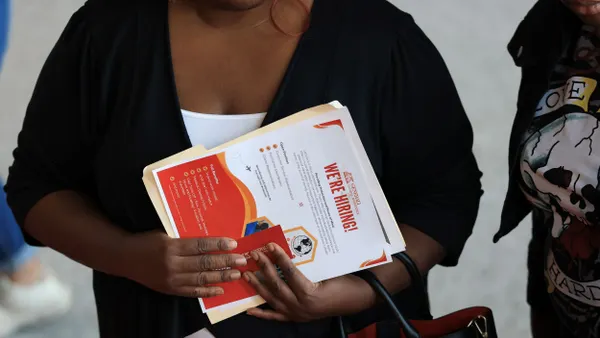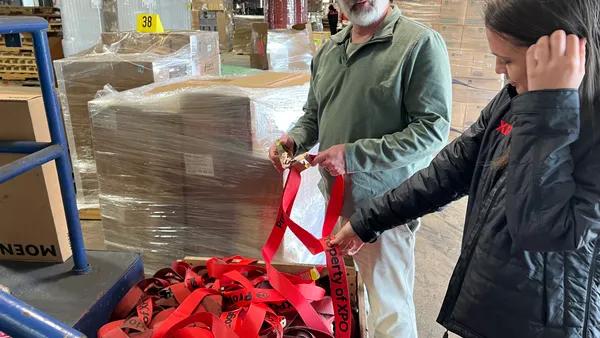Employers can’t just buy their way onto Lioness' job board.
Instead, those that wish to reach the organization's talent pool must be nominated by employees — and able to demonstrate both representation and advancement among them. The company's newly launched job board reflects an initiative in step with what employees demand: employers that prioritize diversity and inclusion and address problems head-on.
A safety net
Sustained through partnerships with law firms and PR clients, the two-year old company has set sights on documentary filmmaking, NFTs and HR consulting — supplemental funding sources that could extend existing operations and support ongoing pro bono work with whistleblowers.
The company is one part investigations, one part first-person narrative storytelling and a full measure of bombshell. Case in point: this essay from current and former employees of Jeff Bezos' Blue Origin.
Those who come to Lioness with stories of power abuse or workplace issues rarely know how to navigate the likely fallout affecting the next phase of their career. And this is where Lioness brings a brand new offering: publisher of whistleblower accounts on one hand, career matchmaker on the other. But more than that.
In a recent interview, co-founders Ariella Steinhorn and Amber Scorah talked about the importance of this work and its motivation.
When it comes to sharing these stories, "[p]utting your name on something like this can mean getting blacklisted," they wrote in a recent blog post. What's been missing, Steinhorn told HR Dive, is "a more broad and immediate base of resources for whistleblowers, including next income generating opportunities." When principled, if not troubled, insiders take that brave first step forward, Lioness can be a safety net.
"It's kind of a natural fit, because, notoriously, when someone blows the whistle, they’ve either left their job, or they’re [being] retaliated against," Scorah explained. For Lioness, these often difficult circumstances represent their niche opportunity: "Here's where we can marry those things together."
A new kind of job board
The Lioness job board was created with whistleblowers in mind, "to bring together good people with good employers," the website reads.
For inclusion on the Lioness job board, an employer must first be nominated by its employees, then meet certain other criteria through vetting by Lioness. "We really wanted to start with smaller, diverse companies with a staff of 50 or less, where we know the founders and their ethos," said Steinhorn, who's led policy strategies at Ford Motor Company and worked in communications at the U.S. Department of Justice.
And by "diverse companies," she expounded — it's those "making efforts to not only hire diversely, but to include and retain [those employees] after they've walked through the doors."
This commitment to job seekers could raise the bar where job boards are concerned, and aiming to be first-in-class carries a certain distinction for Lioness, and for companies that meet this standard.
One such employer is Automotus, a tech firm working to solve the challenges of urban mobility.
When asked about the company's experience with Lioness, Jordan Justus, co-founder and CEO, said the firm investigated how Automotus approached diversity, equity and inclusion, as well as promotions, raises and opportunities for additional professional education — "all organizational values and quantifiable goals proactively monitored to ensure achievement at each stage of the company's recruiting process," he relayed by email. Lioness also looked into the company's benefits package, its parental leave and other PTO policies, and spoke with a number of the staff.
But why Lioness, as opposed to another job board? Because Lioness attracts job seekers who share common values of transparency, respect and equal opportunity, according to Justus. And "the most important traits of a prospective team member — honesty, integrity, empathy, open-mindedness," he wrote, "are not filters that you can sift through on a platform like Indeed, but rather fundamental pillars of a community like Lioness." (Notably, however, job seekers can also find Automotus' open roles on LinkedIn.)
'Retire the PR handbook'
Lioness offered sage advice for C-suite and HR pros who are empowered to change the "old guard" dynamics: "Oftentimes, conversation with HR can feel more like conversation with the general counsel of the company. This should be a more collaborative dialogue, not top down," said Steinhorn.
"Retire the PR handbook. Create an environment where employees feel comfortable coming forward, and listen [when they come]," advised Scorah. “Generally, people want to stay with their companies, but they want their companies to be better. Most often, [those who become] whistleblowers have [already] tried to rectify a problem from the inside."
Employers' early embrace of would-be whistleblowers — an idea others in the industry have encouraged before — could show a willingness to be held to a standard of ethics, could help employees feel more empowered at work and could reduce settlement costs, added Scorah, a Dean's Fellow at Harvard and a Ted-talking whistleblower in her own right.
"There's been a ton of press coverage about how people are quitting their jobs," said Scorah. "They’re realizing they have more options [about] where they're getting their next paycheck, and the kind of people they’ll work with." This is particularly true among knowledge workers, she said, and those in tech. "It's good, though. If this is the way things are trending, I think we’ll treat one another with a little more humanity at work."
Correction: This article has been updated to correct Steinhorn's work history.













